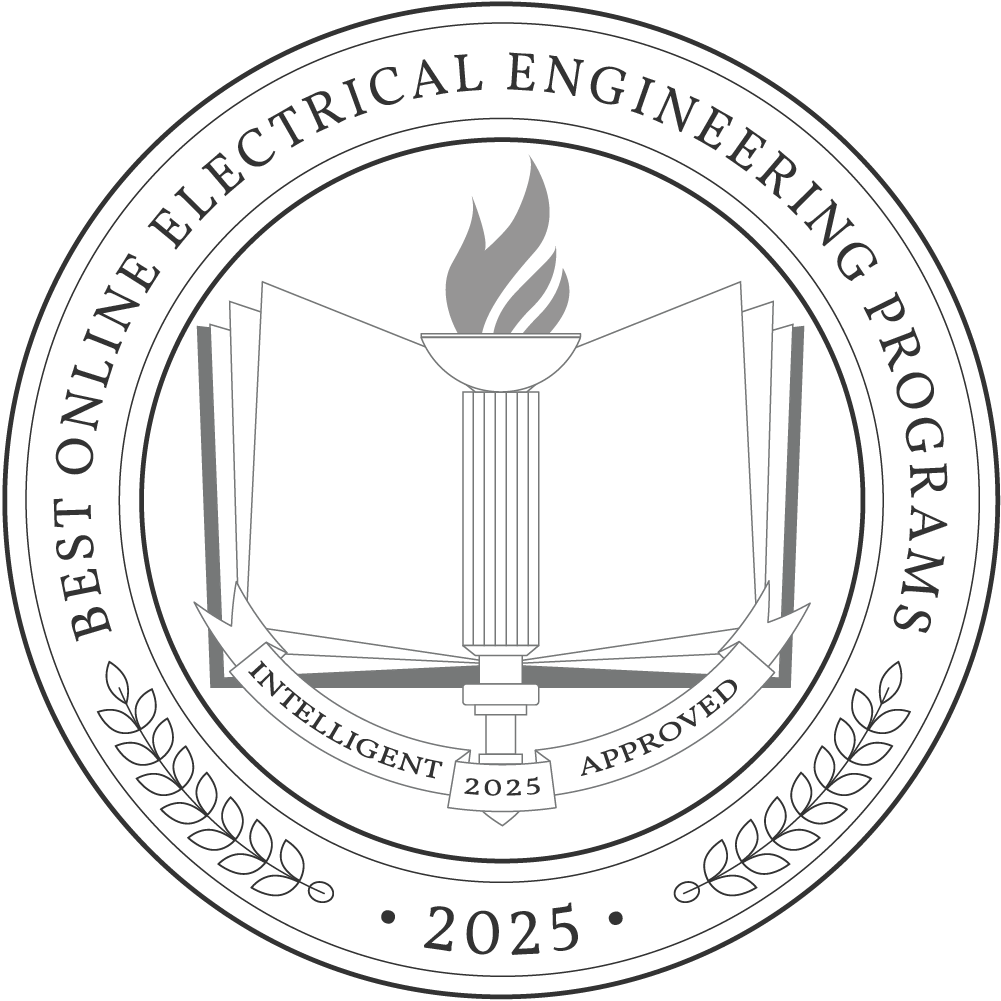To become an electrical engineer, students must earn a minimum of a bachelor’s degree from an accredited university program. Earning a master’s degree in this field can help students advance their careers and take on leadership positions.
Online bachelor’s degrees in electrical engineering typically take four years to complete. According to the National Center for Education Statistics, the average annual tuition for an undergraduate degree program is $7,998 at public universities and $34,923 at private institutions. Meanwhile, the average annual tuition for master’s degrees is $12,596 at public schools and $28,017 at private universities.
The median annual salary for electrical engineers is $109,010, and computer hardware engineers make $138,080. Meanwhile, electrical and electronic engineering technologists and technicians earn $72,800 on average.
Why Trust Us
The Intelligent.com Higher Education Team is dedicated to providing students with independent, equitable school and program rankings and well-researched resources. Our expert-driven articles cover topics related to online colleges and programs, paying for school, and career outlooks. We use data from the U.S. Department of Education’s College Scorecard, the National Center for Education Statistics, and other reputable educational and professional organizations. Our academic advisory team reviews content and verifies accuracy throughout the year for the most current information. Partnerships do not influence rankings or editorial decisions.
- Analyzed over 2,000 national, accredited, and nonprofit colleges and universities
- 800+ rankings pages are reviewed and updated yearly
- Content is informed by reputable sources, surveys, and interviews with academic advisors and other experts
- Over 100 data points are reviewed for accuracy and quality throughout the year, including sources
How we rank schools
Our list features the best online Electrical Engineering degree programs at top colleges nationwide. Each school featured is a nonprofit, accredited institution — either public or private — with a high standard of academic quality for post-secondary institutions.
We evaluated each school’s program on tuition costs, admission, retention and graduation rates, faculty, reputation, and the student resources provided for online students. We collected data from trusted sources like the National Center for Education Statistics, individual school and program websites, school admissions counselors, and other data sources. Then, we calculated the Intelligent Score on a scale of 0 to 100 based on the following criterion:
Academic Quality:
- Admission rate versus enrollment rate
- Retention rate of students who return after year one
- Accreditation status (regional and programmatic)
- Nonprofit status, both private and public institutions
Graduation Rate
- Overall graduation rate
- Total number of currently enrolled students, including diversity metrics
- Student-to-faculty ratio
Cost and ROI
- In-state and out-of-state per-credit tuition rates and fees
- Required credits to graduate
- Earning potential after graduation
- Availability of federal student loans, scholarships, and other financial aid options
Student Resources
- Available student services for online-only and hybrid programs
- On-campus amenities like tutoring centers and the number of libraries
Read more about our ranking methodology.
Best 8 Accredited Online Electrical Engineering Programs
FiltersInstitution Type
Status
- Intelligent Score
- Alphabetically By University Name
- Acceptance Rate
- Enrollment
- In-state Graduate Tuition
- Out-of-state Graduate Tuition
- In-state Undergraduate Tuition
- Out-of-state Undergraduate Tuition

University of North Dakota
Intelligent Score: 99.94In-state: $8,540
Out-of-state: $12,810
In-state: $11,060
Out-of-state: $11,060
SAT: 1000-1230
ACT: 20-27
An online Bachelor of Science in Electrical Engineering is offered by the University of North Dakota (UND), the state's flagship public research institution. This 125-credit hour program takes between four to five years to complete. Required courses include Circuit Analysis, Distributed Networks, and Embedded Systems. The program can be completed entirely online - even the laboratory requirements, which can be done remotely by purchasing a lab kit. There is even a Society of Distance Engineering Students for online engineering students to find community and collaboration without being on campus. Other online student supports from UND include virtual access to the Chester Fritz Library, unlimited remote academic coaching, self-help online study resources, and free virtual tutoring.
$612
Online, On-Campus
Accreditation Board for Engineering and Technology
125

Stony Brook University
Intelligent Score: 99.19In-state: $7,070
Out-of-state: $24,740
In-state: $11,310
Out-of-state: $11,310
SAT: 1230-1440
ACT: 26-32
Stony Brook University - part of the State University of New York (SUNY) public school system - offers an online Bachelor of Science in Electrical Engineering through its College of Engineering and Applied Sciences. The 120-credit hour program is geared towards working professionals who hold full-time jobs and want to increase their education and employability. This highly flexible program is taught online asynchronously by faculty members from three leading SUNY institutions - Stony Brook University, the University at Buffalo, and Binghamton University. Students are sometimes required to go to proctoring centers or other approved venues in their community to take exams. There are four prerequisite courses for admission: Calculus 1, II, and III, and Differential Equations. Stony Brook University stands out on this list for having the most selective rate of admissions (49%) of the public schools.
In-State: $295
Out-of-State: $353
Online, On-Campus
Accreditation Board for Engineering and Technology
120

Florida International University
Intelligent Score: 97.14In-state: $4,721
Out-of-state: $16,529
In-state: $8,912
Out-of-state: $8,912
SAT: 1110-1260
ACT: 23-29
Florida International University - a large, public research university - offers a 128-credit hour online Bachelor of Science in Electrical Engineering through its College of Engineering and Computing. The program places a strong emphasis on critical thinking, problem-solving, and research skills. Core courses include Writing and Rhetoric, Multivariable Calculus, and Circuits Analysis and Lab. The program has three start times each year, and every new student is paired with a success coach. Only first-year students are admitted to the program at this time. They are not accepting transfers. The faculty for the online program are the same as the in-person program at the school's physical campus in Miami. It's a highly affordable online program for a doctoral-level university at $228 per credit hour in-state and $345 per credit hour out-of-state. Online students are also eligible for financial aid and a large variety of scholarships.
In-State: $236
Out-of-State: $649
Online
Accreditation Board for Engineering and Technology
128

Arizona State University
Intelligent Score: 94.62In-state: $10,710
Out-of-state: $28,800
In-state: $11,720
Out-of-state: $11,720
SAT: 1100-1320
ACT: 21-28
$574
Online
Accreditation Board for Engineering and Technology
120

Clemson University
Intelligent Score: 93.31In-state: $14,118
Out-of-state: $37,110
In-state: $10,600
Out-of-state: $10,600
SAT: 1210-1390
ACT: 27-32
South Carolina's Clemson University offers an online Bachelor of Science in Electrical Engineering degree completion program through its Holcombe Department of Electrical and Computer Engineering. This program is an opportunity for students with some electrical engineering coursework at other institutions to complete their bachelor's degree at Clemson. It is not intended for students graduating from high school but for working professionals looking to finish their engineering degrees. Three optional certificate programs are also available in Renewable Energy, Power System Engineering, and Advanced Power System Engineering. Clemson's program is asynchronous. Students can view pre-recorded lectures at a time most convenient for them. Interactions with professors happen through email, phone, and scheduled Zoom meetings.
$550
Online
Accreditation Board for Engineering and Technology
128

Mississippi State University
Intelligent Score: 92.96In-state: $8,800
Out-of-state: $23,840
In-state: $8,800
Out-of-state: $8,800
SAT: 1050-1270
ACT: 22-30
$402 - $419
Online
Accreditation Board for Engineering and Technology
128

Washington State University
Intelligent Score: 90.77In-state: $10,202
Out-of-state: $25,145
In-state: $11,781
Out-of-state: $11,781
SAT: 1020-1210
ACT: 20-26
Washington State University Everett offers a Bachelor of Science in Electrical Engineering through its School of Electrical Engineering and Computer Science. This two-year, full-time degree completion program is designed for transfer students from community colleges or four-year institutions. Admissions requirements include an overall GPA of at least 2.5 and completion of prerequisite courses, including English composition, Linear Algebra, and Calculus I and II. Washington State's program prepares students for careers in the research, testing, development, and manufacturing of electronic systems and equipment. Scholarships are available at the university level and from the Voiland College of Engineering and Architecture and the School of Electrical Engineering and Computer Science.
Resident: $592
Non-Resident: $1,420
Online, On Campus
Accreditation Board for Engineering and Technology
123

Lamar University
Intelligent Score: 90.70In-state: $6,129
Out-of-state: $15,945
In-state: $6,397
Out-of-state: $6,397
SAT: 943-1140
ACT: 17-23
Resident: $259
Non-Resident: $669
Online, On Campus
Accreditation Board for Engineering and Technology
120
How To Choose an Online Electrical Engineering Program
Choose your area of study
Many online electrical engineering programs will allow you to select a concentration and focus your studies on a particular niche in this field, such as power systems, communications, computer science, controls, or data analysis. If you already know what you would like to do after you graduate, look for programs that closely match these career goals.
Research schools and programs
You should only apply to institutions that have been approved by a DOE-recognized regional accrediting organization, such as the New England Commission of Higher Education or Northwest Commission on Colleges and Universities. These organizations evaluate schools to ensure they provide students with a high-quality education. Those who attend a school that isn’t regionally accredited may be unable to access financial aid or transfer credits to another institution if needed.
You should also look for programmatic accreditation from the Accreditation Board for Engineering and Technology (ABET), as this is essential for obtaining a professional license as an engineer.
Making a list of questions can give students direction in their research efforts. These questions may include:
- Who are the faculty members, and what are their credentials?
- What student support services does the school offer?
- What are the graduation requirements?
To learn more about any schools that you’re interested in, you can visit the school’s website, contact an admissions counselor, follow the school on social media, or attend an in-person or virtual open house.
Prepare for tests and applications
Application requirements vary by school and program. Typically, an application for an online electrical engineering program will include the following:
- Resume
- Letters of recommendation
- Official transcripts from all previously completed education
- Personal statement of interest
Some bachelor’s degree programs in electrical engineering may require SAT or ACT scores. At the master’s level, students may have to submit GRE scores and have prerequisite coursework or a certain undergraduate GPA.
Students applying to multiple programs simultaneously will benefit from creating a spreadsheet to avoid missing necessary steps. And you should always contact an admissions counselor to ensure you have the most accurate information regarding program requirements and deadlines.
Select your program
Selecting a program involves considering every aspect of the application process, including the costs associated with each one a student submits. To avoid overspending, students may want to pick their top two or three programs to start the process and then send in other applications later if they receive a denial.
Before making your final decision, review your needs and goals again. Do you plan to attend school full-time or part-time? Do you want your program to be as online as possible, or are you fine with a hybrid program that has a fair amount of in-person requirements? Some programs offer asynchronous courses, which can be completed at your own pace, while others only offer synchronous courses, which involve remotely attending lectures and completing assignments at the same time as other students — which of these two online learning formats do you prefer? Your school should accommodate your scheduling needs and learning preferences.
Determine how you’ll pay for your degree
There are numerous financial aid resources available to students enrolling in an online electrical engineering degree program. Start with the Free Application for Federal Student Aid (FAFSA) to determine your eligibility for federal student loans, grants, scholarships, fellowships, and work-study jobs.
Students should also explore scholarships, grants, and other funding from local organizations, nonprofits, religious organizations, and professional development groups. Students working full-time while attending school can talk to their employers about tuition assistance programs.
Contact the school’s financial aid department early for information about all opportunities. They can help students explore many avenues for financial assistance.
What Can You Expect from an Online Electrical Engineering Program?
Students in an online electrical engineering degree program can expect to build science, math, physics, and computer skills acquired from courses and lab work. They study electrical systems, devices, and circuits to create or improve devices to make them easier to use.
Electrical engineers work on anything that uses electricity, plugs, or motors. Depending on the concentration, students may focus on areas such as robotics, nanotechnology, biosystems, or energy. Other concentrations include mobile and satellite communications, fiber optics, and electrical machinery.
Some programs require internships or co-op experiences at the bachelor’s level. In a master’s program, internships or practicums are usually part of the curriculum, along with a final project or thesis.
Online bachelor’s degree programs take full-time students four years, while master’s programs take two years. However, students who enroll in accelerated programs can complete their degrees in less time by taking classes at a faster pace.
Potential courses you’ll take in an online electrical engineering degree program
- Electromagnetics. In this introductory course, students study electricity and magnetics and various theories and laws, such as Coulomb’s, Gauss’s, Biot-Savart, and Ampere’s Laws. Other topics include conductors, capacitors, induction, and torque.
- Engineering Ethics. Many programs offer this class to sophomores, teaching students the importance of integrity in the field, legal aspects, leadership, and how to handle various issues that may arise as an engineer.
- Technology Management. In this third-year course, students learn how to manage people working in technology. They also learn how to meet the technological needs of companies, including identifying needs, selecting the right equipment, and acquiring and protecting the technology.
- Design Projects. Before graduation, students will often need to complete a design project that uses their engineering skills. They design, create, test, and oversee the project from start to finish.
- Wireless Communications. In this master’s-level course, students explore the designs of cell phones, internet systems, video, radio, and other wireless products to discover areas for improvement.
- Computer Design. Students learn how computers are made, including processors, memory storage, hardware, and software, in this master’s-level course.
What Can I Do With an Online Electrical Engineering Degree?
Career outlook
An electrical engineering degree equips students with valuable skills and knowledge, such as circuit design, systems analysis, and signal processing, that they can apply to a wide range of career paths. Graduates of electrical engineering programs go on to work in diverse industries, including telecommunications, electronics, power generation, and aerospace.
A bachelor’s degree qualifies graduates for most entry-level and mid-level electrical engineering positions. Students can complete internships and co-op programs to stand out more to employers, and graduates can seek a master’s degree to make themselves eligible for advanced or leadership positions.
Some of the most common occupations for workers with this degree include:
- Electrical and electronics engineer — Design, develop, build, test, and maintain electrical systems and devices.
- Median annual salary: $109,010
- Projected employment growth (through 2032): 5%
- New jobs projected: 17,800 per year
- Aerospace engineer — Design, develop, and test aircraft and aerospace products such as missiles, spacecraft, and satellites.
- Median annual salary: $130,720
- Projected employment growth (through 2032): 6%
- New jobs projected: 3,800 per year
- Computer hardware engineer — Research, design, develop, and update computer systems and hardware components.
- Median annual salary: $138,080
- Projected employment growth (through 2032): 5%
- New jobs projected: 4,600 per year
Online Electrical Engineering Degree Program Frequently Asked Questions
How do I apply to an online electrical engineering degree program?
As application requirements vary from school to school, students should always double-check with the school’s admissions office before applying. Admissions counselors can also help students organize application materials to ensure they meet deadlines.
Most online electrical engineering degree programs ask students to submit an application and fee, as well as supporting documents like official transcripts, letters of recommendation, resumes, personal essays, and standardized test scores. For undergraduate students, the most common standardized tests are the SAT or ACT, while graduate students usually submit GRE scores.
How much does an online electrical engineering degree cost?
The cost of an online electrical engineering degree will vary based on multiple factors, including whether a student is attending a public or private institution. Private universities are typically more expensive, but they charge a flat tuition rate regardless of where students live. Public schools are usually less expensive, but they may charge higher tuition rates for students who are from out-of-state.
How long does it take to earn an online electrical engineering degree?
Students must earn a minimum of 120 credits to get their bachelor’s in electrical engineering degree, which typically takes four years of full-time study. A part-time student may take 5-6 years to complete the degree. A master’s in electrical engineering requires a minimum of 30 credits, which can take 1-2 years to complete, depending on a student’s enrollment status.
Is an online electrical engineering degree worth it?
Individuals who wish to enter electrical engineering or related industries will highly benefit from the completion of a bachelor’s degree. It’s a prerequisite for nearly all entry-level positions in the field. As an electrical engineer, you’ll have access to particularly high salaries — the median annual income for an electrical engineer is $109,010, while the median annual income of all occupations is $48,060.

